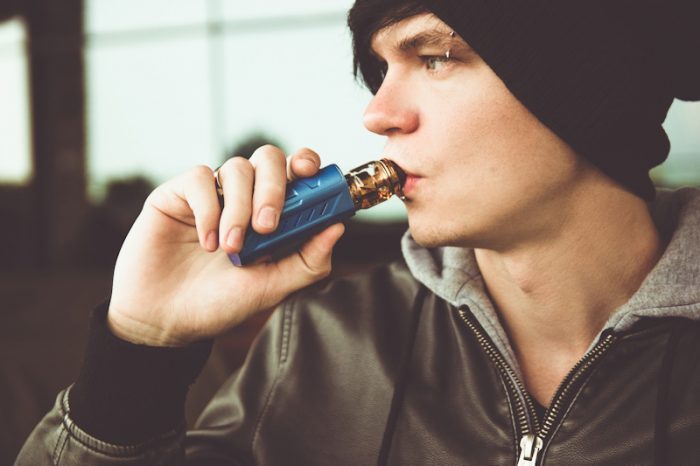Professor Bauld Cautions Over Consequences
Professor Linda Bauld is a highly respected public health expert, working as the John Usher Chair of Public Health in The Usher Institute at the University of Edinburgh and Chief Social Policy Advisor to the Scottish government. She responded to the recent concerns being expressed about flavoured e-liquids and the current push to increase regulation on vape products.
 The Guardian’s Madeleine Finlay recently exclaimed: “Banana Foam, Core Twister, Brain Freeze, and Grandma’s Peanut Butter Fudge – these aren’t the contents of a sweet shop, but flavours of e-cigarette liquids. While they might be enjoyed by adults with a sweet tooth, lots of ‘experts’ are worried these sugary concoctions are enticing increasing numbers of young people into vaping.”
The Guardian’s Madeleine Finlay recently exclaimed: “Banana Foam, Core Twister, Brain Freeze, and Grandma’s Peanut Butter Fudge – these aren’t the contents of a sweet shop, but flavours of e-cigarette liquids. While they might be enjoyed by adults with a sweet tooth, lots of ‘experts’ are worried these sugary concoctions are enticing increasing numbers of young people into vaping.”
Much is made of flavours and packaging making products ‘aimed at children’. But what is the reality when it comes to actual confectionary? Are real sweet products the preserve of children only?
According to Mintel, the UK chocolate market alone was predicted to be worth £5.9 billion by the end of last year. That’s not a pocket money market segment!
Despite the push towards healthier lifestyles, the confectionary industry was one of those that blossomed during Covid-19 as more adults saw sweets and chocolate as a little treat to be indulged on a more frequent basis. In a survey for The Grocer, 20% of adults said they eat chocolate every days and a further 36% said they eat it two to three times per week.
It’s clear from this that flavours play a key role in adult oral experiences.
Professor Linda Bauld said: “The evidence for vaping as a tool to stop smoking has built over time. It’s actually very strong now, we have over several large, randomised control trials – well conducted studies – that show that vaping is highly effective, in fact more effective than nicotine replacement therapies for smoking cessation.
“If you speak to most vapers, they’ll tell you that they don’t plan to do it indefinitely, but we do see people use it for longer than nicotine replacement therapy.”
This is true, and studies have shown this. But importantly, the authors of those studies believe that smokers using vapes for longer than they would a nicotine patch or gum is the reason why vaping works far better than nicotine replacement therapy.
What about vaping vs smoking?
“Most vaping products contain propylene glycol,” continues Prof Bauld, “which itself is not harmful, we use it in lots of different products. You’re also breathing in constituents in the flavourings – and sometimes we’ve been concerned about those which is why some compounds are banned [like diacetyl] in vapes in the UK.”
Studies have shown that the content of vapour is “at least 95% safer” than breathing in smoke.
When it comes to concerns over young people using nicotine products, Professor Bauld goes on to say: “Nicotine is addictive, but in medicinal products we don’t see high levels of addiction. Nicotine itself is not harmful, it’s prescribed in NRT to people with heart conditions, we can give it to pregnant women who smoke.”
On worries that vaping causes lung disease, Linda Bauld continues: “There were a number of cases, primarily in the USA, a few years ago, from contaminated vapes, the so-called EVALI outbreak. These were products that contained vitamin E acetate and cannabis oil. We now know it was a public health outbreak caused by a chemical that shouldn’t have been there.”
Should we be concerned about young people vaping?
Professor Bauld says: “I don’t think we should be as worried about this as you would believe if you read the newspapers or the media. There’s a huge panic about these products, and to put it in context, almost 84% of 11-17yr olds in Great Britain have never tried or are unaware of e-cigarettes – we do not have an explosion in youth vaping.
“We have an increase that we need to deal with, by some policy shifts, not big ones. We already have very comprehensive vaping regulations in the UK – age of sale, a ban on most forms of marketing, limits on nicotine, nicotine warnings, child-proof and tamper-proof packaging, and we regulate the constituents of e-cigarettes. That’s a really comprehensive policy framework.”
She concludes that the real policy priority is to continue to enable vaping to help adult smokers quit, something that to date has delivered the second lowest smoking rate across the European continent- “vaping has helped us get there!”
Looking at threats to children, Professor Bauld cautions that childhood obesity poses a far greater challenge, with drug use and general health inequalities also being areas of real concern for her.
“Let’s take action to address youth vaping, but let’s not take products away from adult smokers – and let’s put it all in perspective and not panic.”
Wise words from one of the country’s leading experts.

Comments are closed here.